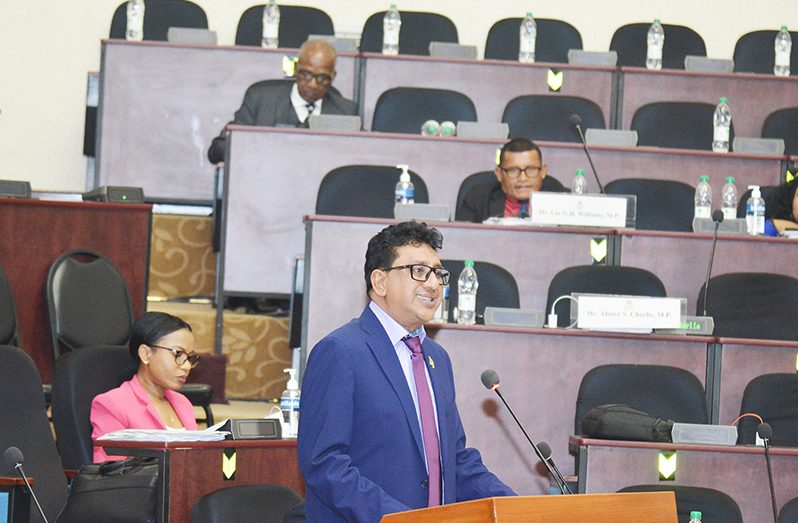–as House passes modern, milestone Arbitration Bill
GUYANA is now on track to become a hub for arbitration, as the new and modern Arbitration Bill of 2023 was passed in the National Assembly.
The Arbitration Bill No. 18 of 2023 was read for the second and third time during the 82nd sitting of the twelfth parliament. Its passage paves the way for the facilitation of domestic and international arbitration by encouraging the use of this method to resolve disputes.
While presenting the bill for its second reading, Attorney-General and Minister of Legal Affairs, Anil Nandlall, S.C., said that the government, since 2020, started the overhaul of the country’s entire legislative and institutional tapestry to facilitate and foster Guyana’s rapid economic expansion.
Against this backdrop, he said that in expanding the commercial environment, contracts, both at the state and private sector levels, involve billions of dollars with both local and international companies.
These contracts, Nandlall added, cater for the resolution of disputes that might arise between parties. In this case, litigation would be relegated to a last resort and arbitration, which is now the preferred method of settling these disputes, would be used.
He told the House that there was an Arbitration Act in Guyana which was enacted in 1916 which was the 1889 Arbitration Act of the United Kingdom that was only amended twice since its enactment, in 1927 and 1931.
“Our statutory arbitral framework is one of the oldest in the world. Naturally, it is completely anachronistic, ancient and unsuitable to meet the demands of today’s commercial environment,” he said.
While noting that the country is lagging behind the rest of the Caribbean in that regard, he added that it is imperative that the laws of the country are updated to make Guyana an attractive destination to be chosen as the seat for arbitrations in Guyana but also the wider Caribbean and even South America.
DEVELOPMENT AND CONSULTATION
The Legal Affairs Minister said that the new bill was drafted using the CARICOM model Arbitration bill which, he said, is based on the Model Law on International Arbitration developed by the United Nations Commission on International Trade Law (UNCITRAL).
Further, while underscoring its importance, he said that the government, during the drafting stages, consulted with stakeholders in Guyana and even saw the establishment of an Arbitration unit within the Attorney General’s Chambers.
The bill, Nandlall said, was then reviewed by two international law firms based in the United States and the United Kingdom which have extensive practice in arbitration.
“These extensive engagements were embarked upon because we want the best possible and most modern arbitral framework for Guyana… the objective is not only to become self-sufficient in terms of arbitration, but to make Guyana an attractive international destination for arbitration,” he related.
The Attorney-General highlighted that this bill follows international standards established by UNCITRAL, but it also contains provisions to enable the government or a private entity to establish an arbitration centre to administer or facilitate arbitration in Guyana.
“This is necessary if we are to become an arbitration hub. This is something we have to actively pursue and make a reality,” Nandlall said.
Making contributions to the debate on the bill, Opposition member, Roysdale Forde emphasised the importance of reviewing the arbitration legislation in Guyana.

BUSINESS LANDSCAPE
Rising to add her support for the bill, Minister of Tourism, Industry and Commerce, Oneidge Walrond said it was dynamic and aligned with Guyana’s trajectory of growth and development.
She related that the global business landscape is rapidly changing and industrialised nations worldwide are forging stronger trade ties with developing countries like Guyana.
“The complex web of international transactions creates a pressing need for efficient mechanisms to resolve disputes that inevitably arise between contracting parties from different countries,” Walrond related.
The minister added that while Guyana has emerged as an attractive business hub with an influx of investors, many of whom have forged profitable partnerships with local entities, discord could arise.
It is with this in mind that she said that companies must embrace the realities of doing business globally, and one fundamental pillar is having an established and trusted arbitration network.
Walrond added, “Enacting alternative dispute resolution laws in Guyana will create a superior business-enabling environment and make for a quantum leap forward. This will contribute to our earning a reputation as a country with best practices in international business.”
She emphasised that the enactment of this legislation will create solid and reassuring guidelines for investors, while ensuring consistency and compliance with international standards.
Opposition member, Geeta Chandan-Edmond also rose to support the bill, and noted that it was a beacon of hope providing a modernised and efficient framework in arbitration.
“The introduction of this reflects a commitment to the modernisation of our legal system and to align it with international best practices,” Chandan-Edmond said.
“By promoting arbitration as a preferred method for resolving disputes, we are not only reducing the burden on our courts but also providing parties with a flexible and tailored approach… arbitration awards are usually final and binding providing certainty and closure to the parties,” she added.
Meanwhile, following presentations by Government MP, Sanjeev Datadin and Opposition member, Khemraj Ramjattan, the bill was then examined clause by clause before it was recommended for its third reading and then successfully passed in the National Assembly.



.jpg)








